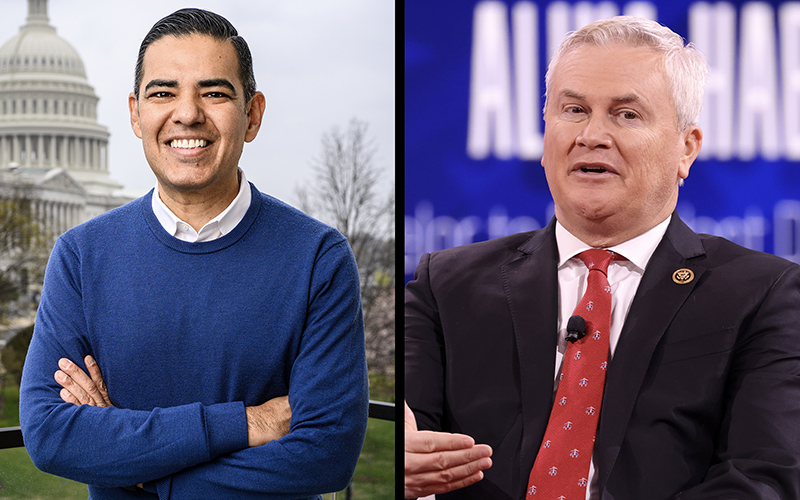The 105 Republicans Who Voted to Expel George Santos
Despite opposition from party leadership, these Republicans broke ranks and voted to expel the embattled New York congressman.

In a historic vote, for only the sixth time in history, the U.S. House of Representatives voted to expel one of its own members, U.S. Rep. George Santos (R-N.Y.), for alleged ethical and campaign finance violations.
Santos, the first out gay Republican elected to Congress as a non-incumbent, had predicted his ouster despite mounting a vigorous defense of himself during debate on the floor of the House.
Santos, who faces 23 federal criminal charges, has claimed that the House Ethics Committee rushed its investigation into allegations against him, with the intent of reaching a predetermined conclusion that he was guilty of wrongdoing.
Despite concerns from some lawmakers over the precedent that voting to expel a member who has not yet been convicted might set, and opposition from Republican House leadership, 105 Republicans — or almost half the caucus — voted with 206 Democrats to remove Santos from office.
The Republican members voting for expulsion were:
- Robert Aderholt, Alabama (North-Central Alabama)
- Rick Allen, Georgia (Augusta, Eastern Georgia)
- Mark Amodei, Nevada (Reno, Northern Nevada)
- Kelly Armstrong, North Dakota
- Troy Balderson, Ohio (Central Ohio)
- Andy Barr, Kentucky (Lexington, Central Kentucky)
- Cliff Bentz, Oregon (Southern and Eastern Oregon)
- Jack Bergman, Michigan (Upper Peninsula)
- Don Bacon, Nebraska (Metro Omaha)
- Stephanie Bice, Oklahoma (Oklahoma City Metro)
- Ken Buck, Colorado (Eastern Plains)
- Larry Bucshon, Indiana (Terre Haute, Evansville)
- Michael Burgess, Texas (Dallas-Fort Worth exurbs)
- Ken Calvert, California (Riverside, Palm Springs)
- Mike Carey, Ohio (Columbus Metro, Western Ohio)
- Buddy Carter, Georgia (Savannah, Costal Georgia)
- Lori Chavez-DeRemer, Oregon (Bend, Willamette Valley)
- Juan Ciscomani, Arizona (Tucson, Southeast Arizona)
- Tom Cole, Oklahoma (Southwestern Oklahoma)
- James Comer, Kentucky (Western Kentucky)
- Dan Crenshaw, Texas (Suburban Houston)
- John Curtis, Utah (Eastern Utah)
- Anthony D’Esposito, New York (Long Island)
- Monica De La Cruz, Texas (Rio Grande Valley, South Texas)
- Mario Diaz-Balart, Florida (Miami-Dade County, Southwestern Florida)
- John Duarte, California (Central Valley)
- Neal Dunn, Florida (Tallahassee, Florida Panhandle, Forgotten Coast)
- Chuck Edwards, North Carolina (Asheville, Western North Carolina)
- Jake Ellzey, Texas (Central Texas)
- Ron Estes, Kansas (Wichita, Southern Kansas)
- Randy Feenstra, Iowa (Northwestern Iowa)
- Drew Ferguson, Georgia (Western Georgia)
- Mike Fitzpatrick, Pennsylvania (Philadelphia suburbs)
- Mike Flood, Nebraska (Lincoln, Eastern Nebraska)
- Virginia Foxx, North Carolina (Winston-Salem, Piedmont)
- Scott Franklin, Florida (Central Florida)
- Andrew Garbarino, New York (Long Island)
- Mike Garcia, California (Palmdale, Lancaster, suburban Los Angeles)
- Carlos Giminez, Florida (Miami-Dade County, Florida Keys)
- Tony Gonzales, Texas (Big Bend Country, Rio Grande Valley)
- Kay Granger, Texas (Fort Worth)
- Garrett Graves, Louisiana (Baton Rouge, River Parishes)
- Mark Green, Tennessee (Middle Tennessee)
- Glenn Grothman, Wisconsin (Fox Valley)
- Michel Guest, Mississippi (Capital-River, Pines regions)
- Brett Guthrie, Kentucky (Elizabethtown, Bowling Green, Owensboro)
- Ashley Hinson, Iowa (Northeast Iowa)
- Erin Houchin, Indiana (Bloomington, Southern Indiana)
- Richard Hudson, North Carolina (Sandhills)
- John James, Michigan (Macomb County)
- Dusty Johnson, South Dakota
- David Joyce, Ohio (Northeastern Ohio)
- John Joyce, Pennsylvania (South-Central Pennsylvania)
- Tom Kean, New Jersey (Skyland region)
- Jen Kiggans, Virginia (Hampton Roads)
- Kevin Kiley, California (Eastern California)
- Young Kim, California (Orange County)
- Darin LaHood, Illinois (Peoria, Northwestern Illinois)
- Nick LaLota, New York (Long Island)
- Nick Langworthy, New York (Western New York, Southern Tier)
- Jake LaTurner, Kansas (Eastern Kansas)
- Bob Latta, Ohio (Northwestern Ohio)
- Daniel Lawler, New York (Hudson Valley)
- Julia Letlow, Louisiana (Northeastern Louisiana)
- Frank Lucas, Oklahoma (Western Oklahoma)
- Nicole Malliotakis, New York (Staten Island)
- Celeste Maloy, Utah (Western Utah, Salt Lake)
- Tracey Mann, Kansas (Western, Northern Kansas)
- Lisa McClain, Michigan (The Thumb)
- Dan Meuser, Pennsylvania (Susquehanna Valley)
- Max Miller, Ohio (Cleveland suburbs)
- Marianette Miller-Meeks, Iowa (Southeast Iowa)
- Marc Molinaro, New York (Hudson Valley, Southern Tier)
- Blake Moore, Utah (Northern Utah)
- Nathaniel Moran, Texas (Piney Woods)
- Greg Murphy, North Carolina (Eastern North Carolina, Outer Banks)
- Dan Newhouse, Washington (Yakima, Central Washington)
- Zach Nunn, Iowa (Des Moines, Southwest Iowa)
- Jay Obernolte, California (San Bernardino)
- Burgess Owens, Utah (Salt Lake, Central Utah)
- Greg Pence, Indiana (Eastern Indiana)
- August Pfluger, Texas (Hill Country, Big Bend Country)
- Hal Rogers, Kentucky (Cumberland Plateau)
- John Rose, Tennessee (Middle Tennessee)
- David Rouzer, North Carolina (Southeastern North Carolina)
- John Rutherford, Florida (Metro Jacksonville)
- David Schweikert, Arizona (Scottsdale, Phoenix suburbs)
- Austin Scott, Georgia (South-Central Georgia)
- Mike Simpson, Idaho (Magic Valley, Eastern Idaho)
- Christopher Smith, New Jersey (Jersey Shore)
- Lloyd Smucker, Pennsylvania (Lancaster, Pennsylvania Dutch Country)
- Pete Stauber, Minnesota (Iron Range)
- Michelle Steel, California (Orange, Los Angeles counties)
- Bryan Steil, Wisconsin (Kenosha, Racine, Janesville)
- Glenn Thompson, Pennsylvania (North-Central Pennsylvania)
- David Valadao, California (Central Valley)
- Jeff Van Drew, New Jersey (South Jersey, Cape May)
- Ann Wagner, Missouri (Suburban St. Louis)
- Dan Webster, Florida (Central Florida)
- Brad Wenstrup, Ohio (Cincinnati exurbs, Southern Ohio)
- Bruce Westerman, Arkansas (Southern Arkansas)
- Brandon Williams, New York (Greater Syracuse)
- Steve Womack, Arkansas (Rogers, Fayetteville, Fort Smith)
- Rudy Yakym III, Indiana (South Bend, North-Central Indiana)
- Ryan Zinke, Montana (Glacier Country, Southwest Montana)
On the other side of the aisle, only four Democrats voted against expelling Santos.
Reps. Nikema Williams (Ga.) and Bobby Scott (Va.) voted against expelling the congressman, while Reps. Jonathan Jackson (Ill.) and Al Green (Texas) voted “present.”
Support Metro Weekly’s Journalism
These are challenging times for news organizations. And yet it’s crucial we stay active and provide vital resources and information to both our local readers and the world. So won’t you please take a moment and consider supporting Metro Weekly with a membership? For as little as $5 a month, you can help ensure Metro Weekly magazine and MetroWeekly.com remain free, viable resources as we provide the best, most diverse, culturally-resonant LGBTQ coverage in both the D.C. region and around the world. Memberships come with exclusive perks and discounts, your own personal digital delivery of each week’s magazine (and an archive), access to our Member's Lounge when it launches this fall, and exclusive members-only items like Metro Weekly Membership Mugs and Tote Bags! Check out all our membership levels here and please join us today!




























You must be logged in to post a comment.